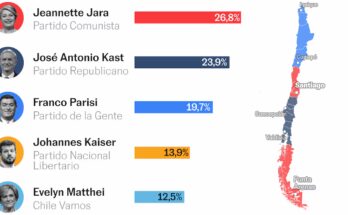The last time the PP’s 14 finance ministers met in a joint conclave with Finance Minister and First Vice President María Jesús Montero, the meeting blew up. Regional leaders of the People’s Party left the table before the end of the demonstration in a coordinated manner so as not to have to vote on debt relief. This Monday, nine months later, everyone returns to a new meeting of the Council of Fiscal and Financial Policy (CPFF) in Madrid without the intention of repeating such an extreme gesture, but with tensions running high. The government called on communities to set the spending ceiling and deficit path. The leaders of the PP will listen to the offer and take a position, but they are sceptical, defining the appointment as “paripé” and criticizing Montero’s “improvisation”, from whom they will ask for a new model of financing system. Already this Sunday they had anticipated the turbulent appointment by sending a joint letter addressed to the minister.
The meeting has become even more heated in recent days due to Pedro Sánchez’s clash with the regional barons of the PP, after the president had attacked his management during his last appearance in Congress, already immersed in the pre-campaign of the cascade of regional elections. The president of the Junta de Andalucía, Juan Manuel Moreno, responded to Sánchez by challenging him to debate with him in the regional parliament. And already this Sunday Alberto Núñez Feijóo referred to the clash between the head of the executive and the barons of his party, against whom Sánchez attacked for the “privatization” of services.
“A true government president dedicated to opposition to the PP, this was the appearance last Wednesday,” Feijóo recalled at an event in Lobón (Badajoz). “Do you know what he did? Annoy the presidents of the autonomous communities. Do you know why? Because they annoy him, because they surpass him and because they defeat him. What a petty thing, right? He thinks he’s the master, he can’t stand that the PP governments make him feel so small”, added the leader of the Popular Party together with the president of Extremadura, María Guardiola, in a pre-campaign on the eve of the CPFF.
The Central Executive has scheduled Monday’s meeting to set the spending ceiling and the deficit path for the period between 2026 and 2028. These are two key coordinates for the general budgets of the State, whose sustainability is compromised by the closing of Junts’ door to the PSOE. But they are also crucial in the drafting of the regional budget, since it defines the spending limit within which the communities must move, whose funds are mainly intended for the welfare state: health, education and social services, which have been transferred exclusively. The establishment of the fiscal path aims to distribute the state deficit between the different administrations. For 2025, for example, the Government has set a deficit target of 2.5% for all administrations. Of that 2.5%, the Central Administration retained 2.2%, Social Security 0.2% and the Communities 0.1%.
This distribution, however, did not thrive in Congress, where Junts combined their votes with PP and Vox to overthrow him. This meant that the autonomies remained with their previous objective, which required them to achieve a surplus of 0.1% and, therefore, reduce their spending capacity. And the same thing can happen again. This Monday the new route will likely go ahead, as the Treasury only needs the support of one community to approve it. But Congress can overturn it again. Treasury sources explain that there is no target set for 2026 that will bring communities to a balanced budget, according to the Central Executive. That is, for communities to continue to tighten their belts, amid growing health and public service needs due to demographic change.
“Communities don’t want deficits”
As is customary before these meetings, the PP councilors developed a strategy organized by the national leadership to present a common front to the CPFF. In an interview with EL PAÍS three weeks ago, the PP’s deputy finance secretary, Juan Bravo, said that “the objective cannot be to go into further debt”. Popular leadership sources add privately: “The communities don’t want deficits, they want balanced budgets.” In any case, councilors will listen to the Treasury’s approach to the spending cap, with no position set in advance. Naturally they will oppose any “cession” to pro-independence groups.
“Let’s see what he offers us,” explains one of the barons. «We have become accustomed to a level of improvisation incompatible with a minimum of seriousness», underline sources from another community. “The stability and debt objectives arrive very late for the majority of the autonomous communities, which have already prepared and are preparing their budgets, they should have been presented before June 30 to guide the path of the autonomies,” underlined on Sunday the Minister of Finance of the Government of Andalusia, Carolina España.
What the popular regional leaders want to focus on is the repeated request to the Treasury for a new regional financing model, which has expired since 2014. Something they agree on with the PSOE and on which Montero is already working. However, some popular presidents fear that the debate will boil down to Catalonia. “The debate has not been opened, it has only been opened with Catalonia and I would like to see whether it has really been opened or not,” said the president of the Balearic Islands, Marga Prohens, in a discussion forum The avant-garde Thursday. The problem for the PP, which presides over 11 communities and the two autonomous cities and also co-governs in the Canary Islands, remains the same: their positions for a possible reform of the system are not the same because they defend different interests depending on the territories. In fact, Montero had already asked them at the last CPFF to present a joint proposal.
The presidents of Galicia, Alfonso Rueda, and Aragon, Jorge Azcón, reactivated the group that signed the appeal in February Declaration of Santiago in 2021, in which eight communities of different political affiliations came together to ask that the distribution of resources be calculated by weighing the criteria of depopulation, dispersion and aging. On the other side there are Andalusia, the Valencian Community and the Region of Murcia, underfunded by the current system, and for its part the Community of Madrid, although they are all pushing to give greater weight to the population.
Furthermore, the interests of the PP communities intersect with those of some PSOE territories. Prohens on Thursday supported the principle of ordinality for the Balearic Islands, a request that Salvador Illa also makes for Catalonia. That is, each community occupies the same position in the classifications of what it contributes and what it receives. Him president Catalonia met its Balearic counterpart on Friday as part of a series of funding talks. “We ask for a clear financial framework, with the same rules for everyone,” but which at the same time “responds to the obviously different needs of each autonomous community,” said Illa, who asked Prohens to leave “the reproaches behind” and row together in the CPFF in search of a satisfactory model. Another obstacle is that the probable rejection of Junts would prevent its subsequent approval in Congress.
In the case of Aragon, the CPFF has another ingredient. So far, Azcón said he hadn’t started preparing his budgets because he needed to know the spending cap. Once the green light has been given there will be no more excuses and the time will begin for the presentation of the Aragonese accounts with Vox fully committed to supporting them. A scenario that could lead to another electoral advance which, as in Extremadura, would take place before the elections in Castilla and León on 15 March.



